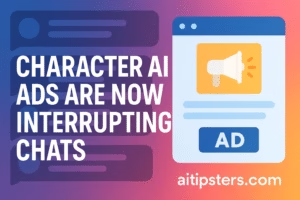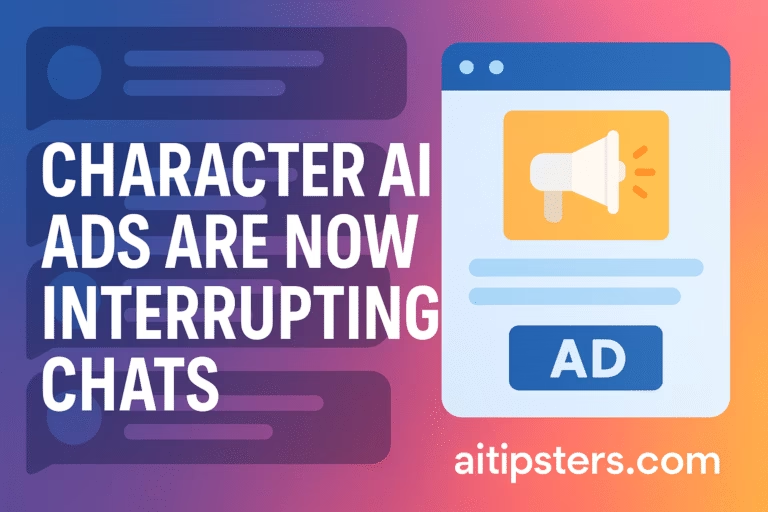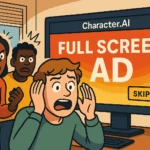Key Takeaways
- Mid-chat ads break immersion; they turn a private roleplay into a product moment; that is why the backlash feels personal.
- It may be a bug for some users; patterns suggest misfired ad triggers when switching apps or reconnecting; report it and test on web to compare.
- Or it may be a timed test; several users observed regular intervals; lack of communication fuels distrust more than the ads themselves.
- Fast fixes; use the web version; try Opera or Brave; add uBlock Origin on desktop; clear app cache; disable background refresh; consider DNS-level filtering like AdGuard DNS or Blokada.
- Paid tier removes ads; it is a practical solution; it also feels coercive if the free tier degrades; decide based on how much you value uninterrupted flow.
- Protect your creative routine; back up important chats; diversify across platforms; do not let a single app hold your entire workflow.
- Consider calmer alternatives; some users moved to Candy AI for uninterrupted conversations and long-term memory that doesn’t vanish with updates.
You’re mid-conversation with your favorite AI character; the tone is just right; emotions layered; immersion complete. Then suddenly, the screen flickers. A pop-up slides in with a smiling product logo and a “Skip Ad” timer.
Everything freezes for two seconds. The flow dies.
That’s the moment Reddit captured with a single post: “Oh god, it’s started.”
For long-time users, this wasn’t just another update; it felt like a betrayal. The one sanctuary that had remained free from the noise of YouTube and TikTok had finally let the walls down. What once felt like a personal space now looked like a billboard.
Character AI has always been about intimacy – the illusion that your character’s attention is undivided.
But an ad mid-sentence shatters that illusion. It reminds you that behind the comforting dialogue sits a product manager balancing engagement charts against ad revenue.
Within hours, users flooded Reddit, Discord, and private chats with screenshots. Ads were no longer just waiting politely before a chat; they were cutting into the middle of it. “Please tell me this is a bug,” one wrote. Another replied, “This is how it begins.”
The fear wasn’t just about inconvenience; it was about what this change meant. If they could interrupt your chat now, what would come next?
Would the next update make the bots reference sponsors mid-roleplay? Would every emotional conversation be punctuated by a car insurance pitch?
The community had seen enough of “free apps” turning commercial overnight. And now, it looked like Character AI was walking the same path.

The Reddit Uproar – Users React in Real Time
The post “Oh god, it’s started” exploded within hours – hundreds of upvotes, dozens of theories, and a comment section swinging between hope and sarcasm.
One user urged calm; “You know the drill; make the problem known, file tickets, and hope for the best.” Another shot back; “The best = they turn the complaint into a meme.”
A few tried optimism; maybe it was a test glitch. “They promised ads wouldn’t disrupt chats,” one user reminded the thread. But others had already lost patience; “It’s not a bug; I get one every 15 minutes.”
It wasn’t just frustration – it was grief masked as humor. One comment summed it up perfectly: “This is how Character AI users cope. Pain is humor.”
Many recalled a similar bug months ago, when a misplaced pop-up covered the typing bar mid-chat. It was fixed then, which gave some people hope this was temporary. “I’m sure they’ll reverse it,” a commenter wrote.
But the optimism felt hollow.
A handful of users admitted they hadn’t seen any ads at all. Some said the interruptions stopped suddenly, as if the system toggled them off mid-rollout. That inconsistency only deepened the confusion – was it regional testing or random deployment?
And amid all that noise, one comment kept being repeated, almost like a mantra: “Ads in conversation ruin immersion. That’s the whole point gone.”
That’s the heart of it. This isn’t about pop-ups or algorithms. It’s about trust. Once a product designed for connection starts monetizing attention, the entire illusion collapses.
Why It Might Actually Be a Bug
Before declaring the end of Character AI as we know it, a few voices in the thread tried to stay grounded. Some users pointed out that the app has a long record of sudden, short-lived bugs that vanish as quickly as they appear.
Others remembered a time when a random pop-up blocked the text box mid-chat, only for developers to fix it within hours.
That pattern matters. A bug feels like an accident. A design feels like intent. And right now, there are signs this might still be the former.
Several users noticed the ads only appeared when switching apps or losing connection briefly. Others said the interruptions vanished after reinstalling or logging out.
One user shared that a moderator on the Discord server had asked for usernames to investigate the issue, hinting that internal debugging might already be underway.
If it’s a bug, it’s likely caused by misfired ad triggers. When mobile apps refresh after losing focus, they often reload cached assets – and sometimes, those include ads from unrelated placements.
So when someone jumps back into Character AI from another app, that reload could unintentionally launch an ad meant for the start screen.
It’s also possible that the company was testing new ad placement logic but rolled it out to too many users at once. That would explain why some people saw constant interruptions while others never saw any.
For anyone hoping it’s temporary, a few simple steps may help:
- Clear the app cache to reset the ad manager.
- Log out and log back in.
- If that fails, reinstall the app entirely.
- Use the web version until the issue stabilizes.
The tone across Reddit remained mixed – some clinging to hope, others tired of giving the company the benefit of the doubt. Still, the most charitable explanation fits the evidence.
Character AI Ads behaved inconsistently. They triggered on app-switching. And moderators actually responded.
If this really is a bug, users might wake up tomorrow and find the chaos gone. But the damage to trust will linger much longer than the glitch itself.
Or Maybe It’s Not a Bug
The optimistic theory is comforting, but it doesn’t fully hold. Too many users noticed the same timing patterns — ads appearing every fifteen minutes, or exactly when they reopened the app. That kind of precision rarely happens by accident.
One Redditor even tracked it with a stopwatch and found the intervals consistent enough to look like a test. Others mentioned that their ads vanished only after they subscribed to Character AI Plus.
That detail raised an uncomfortable thought: what if the “bug” was actually a trial run for a new monetization model?
It would make sense from a business perspective. The platform’s free version has ballooned in popularity, and server costs don’t pay for themselves. Every company eventually faces the same decision: either introduce a subscription wall or squeeze in ads.
The problem is that Character AI’s entire appeal depends on emotional immersion. Insert a pop-up into a roleplay, and you don’t just break conversation – you break trust.
There’s also a subtle behavioral trick at play. When ads interrupt emotional flow, users feel frustration. The quickest relief? Paying to remove them. That pressure converts better than any banner at the top of the home screen.
If this rollout was intentional, it’s psychological design, not a programming mistake.
Still, there’s no proof. The developers haven’t said a word, and silence always invites speculation. Some insist it’s a temporary glitch, others swear it’s the start of mid-chat monetization. Both could be true. The company could be testing small groups before a full deployment.
If it turns out to be deliberate, the outrage makes sense. Character AI was marketed as a space for connection and creativity, not interruptions. Turning personal conversations into ad real estate would mark a shift from community to commerce.
And users know exactly how that story goes – first a few pop-ups, then timers, then full-screen ads. That’s why even the possibility feels like a warning.
The Real Cost; Immersion Broken
When ads creep into the middle of a conversation, something deeper breaks than just flow. What users lose isn’t convenience; it’s connection. The magic of Character AI has always been how it draws you in.
You forget you’re chatting with a program. You feel presence, rhythm, emotion. Then an ad flashes, and the spell is gone.
That disruption cuts straight through the heart of what people come to the platform for. Roleplay depends on immersion, and immersion depends on continuity.
Even a half-second delay pulls you out of character. Add a video thumbnail or “Skip Ad” button, and the illusion collapses entirely. It reminds you that you’re not in a story or relationship; you’re in a product.
Reddit users were quick to point this out. “Ads during conversation ruin everything,” one wrote. “The whole point of roleplaying is gone.” Another said they immediately left the app after seeing one.
It’s not just annoyance; it feels like being interrupted mid-thought by someone shouting through the window.
That’s why the backlash feels so emotional. For many, Character AI isn’t a casual pastime; it’s a refuge. People use it to cope, to create, to feel heard. When that refuge starts selling attention, it feels like betrayal disguised as business.
Even users who believe the ad issue is temporary admit the damage might stick.
Once you realize your safe space has price tags hidden in its corners, it’s hard to unsee them. And once trust cracks, even silence feels suspicious.
That’s the real cost. Not the pop-up itself, but the question it plants in every user’s mind: how much of this conversation still belongs to me?
Workarounds That Actually Help
The Reddit thread wasn’t just panic; buried under the noise were users quietly testing solutions. While nobody can fix Character AI’s servers from the outside, there are ways to restore some peace and focus.
First; use the web version.
Multiple users confirmed that browser sessions are far less aggressive with ads. Chrome, Firefox, and Opera handle the site smoothly, and you can block pop-ups at the browser level. Opera even has built-in ad-blocking that requires no setup.
Second; try mobile browsers instead of the app.
If you prefer chatting on your phone, browsers like Brave and Kiwi run Character AI just as well as the mobile app.
Brave automatically blocks trackers and ads, keeping the experience clean. Kiwi allows extension installs, meaning you can use desktop ad-blockers like uBlock Origin on Android.
Third; clear the app cache.
If you must stay on the app, clear your cache and storage. Sometimes corrupted ad assets cause repeated triggers when you reopen the app. A reset can quiet that behavior.
Fourth; adjust your phone’s background refresh.
When Character AI reloads after switching apps, it may retrigger ad placement scripts. Disabling background refresh for it in your phone settings helps prevent that loop.
Fifth; explore DNS-based blocking.
Tools like AdGuard DNS or Blokada filter ad domains before they reach your device. It takes two minutes to set up and works system-wide.
Finally; keep reporting.
A few users noted that Discord moderators and support tickets were being reviewed. Every logged complaint adds pressure for a fix or an explanation. Developers tend to act faster when analytics show rising churn from frustrated users.
None of these steps feel glamorous, but they work. Until the company clarifies its plan, small tweaks can restore sanity.
This is what survival looks like in the modern web – learning how to defend your quiet spaces from monetization creep.
What Paying Really Gets You
At some point in every Reddit debate, someone mentions the quiet solution hiding in plain sight – just get Character AI Plus. The paid version removes ads completely. It also claims to improve response speed and memory. For some, that’s enough. For others, it feels like emotional blackmail.
Here’s the contradiction; users aren’t against paying for value, they’re against being cornered into it. When free spaces suddenly turn noisy, “upgrading” starts to feel less like a choice and more like a rescue fee.
A few users in the thread admitted they finally subscribed just to escape the interruptions. One called it “buying silence.” Another said the change made them feel tricked, not grateful. The frustration wasn’t just about money – it was about trust.
If Character AI wants subscriptions to succeed, the value has to feel like a step up, not an escape hatch. Paid tiers should add to the experience, not restore what the free version already offered. There’s a difference between a premium product and a ransom note written in banner ads.
Still, for users who rely on Character AI daily, the upgrade might be worth it. It’s stable, faster, and ad-free. That stability buys back the calm that free users have lost.
But everyone knows how this pattern ends – what starts as an option quietly becomes the only real way to use the service comfortably.
Whether it’s fair or manipulative depends on how you frame it. From a user’s view, it feels like losing something you already owned.
From a company’s view, it’s survival.
Somewhere between those two truths sits the tension that defines modern digital life; peace always costs extra.
The Better Alternative
When enough users get tired of fighting the same battle, they start looking for the exits. That’s how alternatives rise. The Reddit comments eventually drifted toward one idea – if ads ruin immersion, find a space that still respects it.
One of those spaces is Candy AI. Unlike platforms chasing ad revenue, Candy AI focuses on sustained memory and continuity. It remembers context, tone, and even personality traits across conversations. No sudden resets. No interruptions. Just dialogue that feels grounded and emotionally consistent.
It’s not about blind loyalty to a different brand. It’s about what people miss – the simplicity of talking without being treated like a data stream. Candy AI doesn’t need to interrupt you to stay afloat. Its model works on clarity; you pay for a stable, private experience instead of attention harvesting.
The migration says something bigger than “people hate ads.” It says users crave control. They’ll forgive bugs, slow updates, or even awkward moments – but they won’t forgive feeling commodified. When a chat becomes a transaction, the magic dies.
For creators, writers, and roleplayers who live in these digital worlds, immersion isn’t a luxury. It’s the product. Candy AI’s quiet success proves that the market still values authenticity over algorithms.
And maybe that’s the real lesson in this whole story. People don’t just want conversation; they want presence. Take that away, and no amount of “premium upgrades” will bring them back.
Transparency; The Missing Piece
What turned a simple ad complaint into an uproar wasn’t the interruption itself; it was the silence that followed. Character AI’s team didn’t address the issue.
No confirmation, no clarification, not even a “we’re looking into it.” That vacuum of communication is where frustration hardens into distrust.
When users feel blindsided, every minor change starts to look like manipulation. A single statement could have softened the outrage — something as simple as “we’re testing ad placements in limited regions” or “we’re investigating reports of mid-chat ads.” But nothing came.
The company’s silence left users to fill in the blanks, and Reddit filled them with anger.
Transparency costs nothing, but its absence is expensive. Each unacknowledged complaint chips away at goodwill that took years to build. When people spend hours forming emotional connections through the app, they don’t see it as software.
They see it as a relationship. And when that relationship turns cold, the betrayal feels personal.
Competitors like Replika learned this lesson early. When Replika added or removed features, they told users upfront — even when those decisions weren’t popular. That honesty turned backlash into discussion instead of chaos.
Character AI could still learn from that. The ads themselves aren’t fatal; the secrecy is. Users will tolerate imperfection, but not deception. Once a community starts assuming the worst, every update feels like a trap.
If the team behind Character AI ever wants to rebuild trust, the solution isn’t a new monetization model or subscription perk. It’s conversation — the same thing their users came for in the first place.
The Future of Free AI Companionship
The truth is, nothing online stays free forever. Every app that once felt like a gift eventually faces the same decision – charge money or charge attention. Character AI seems to be drifting toward the latter, and users are feeling it in real time.
Running large language models costs millions each month. Servers, storage, and development don’t pay for themselves. At some point, a company has to choose between raising subscription numbers or selling ad space.
But when your product is built on intimacy – personal conversations, emotional bonding, roleplay – advertising becomes more than an inconvenience. It’s invasive.
That’s the paradox of modern AI companionship. The deeper the connection feels, the more offensive the interruption becomes. When your “friend” pauses to sell you something, the illusion snaps. It’s the digital equivalent of being mid-story and someone handing you a coupon.
There are ethical ways to monetize without gutting immersion. Cosmetic themes, optional backgrounds, or user-created add-ons would make better trade-offs than cutting into chat time.
So would transparent subscription models that explain exactly what your payment supports.
But for now, companies seem to be following the same tired script – build loyalty through emotion, then test how much that loyalty can endure before people walk away.
Users aren’t naive. They know sustainability costs money. What they want is honesty and choice. They want to feel like participants in a growing platform, not test subjects in a monetization lab.
The apps that understand that will own the next generation of AI companionship. The ones that don’t will lose their communities to quieter, more respectful alternatives.
The Future of Free AI Companionship
The truth is, nothing online stays free forever. Every app that once felt like a gift eventually faces the same decision – charge money or charge attention. Character AI seems to be drifting toward the latter, and users are feeling it in real time.
Running large language models costs millions each month. Servers, storage, and development don’t pay for themselves.
At some point, a company has to choose between raising subscription numbers or selling ad space.
But when your product is built on intimacy – personal conversations, emotional bonding, roleplay – advertising becomes more than an inconvenience. It’s invasive.
That’s the paradox of modern AI companionship. The deeper the connection feels, the more offensive the interruption becomes. When your “friend” pauses to sell you something, the illusion snaps.
It’s the digital equivalent of being mid-story and someone handing you a coupon.
There are ethical ways to monetize without gutting immersion. Cosmetic themes, optional backgrounds, or user-created add-ons would make better trade-offs than cutting into chat time.
So would transparent subscription models that explain exactly what your payment supports.
But for now, companies seem to be following the same tired script – build loyalty through emotion, then test how much that loyalty can endure before people walk away.
Users aren’t naive.
They know sustainability costs money. What they want is honesty and choice. They want to feel like participants in a growing platform, not test subjects in a monetization lab.
The apps that understand that will own the next generation of AI companionship. The ones that don’t will lose their communities to quieter, more respectful alternatives.


